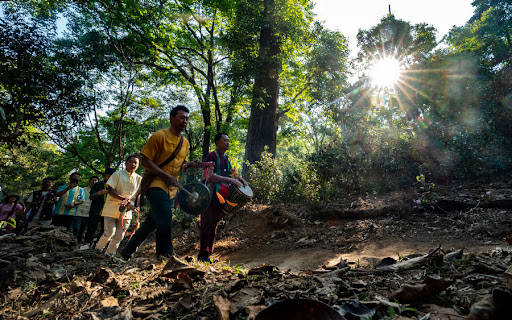In the Lancang Lahu autonomous county of Yunnan province, the arrival of spring signifies the start of the tea-picking season. The locals marked this occasion with a vibrant ceremony held at Jingmai Mountain, which is renowned for its dense forests of ancient tea trees. The annual ritual takes place towards the end of March and is a tradition among local ethnic minorities such as the Blang and Dai. It provides a perfect opportunity to pay respect to the tea forest, which has been around for centuries, and to honor their ancestors before harvesting the gifts of nature.
For centuries, the Jingmai Mountain has been an integral part of the locals’ lives. They have continued to maintain an ancient method of tea cultivation featuring a unique multi-layered ecosystem. This approach to tea cultivation allows for the rational use of land, which is the key to maintaining harmony between humans and nature, according to Xiong Dengkui, an associate researcher with the Lancang county museum.
The village is located halfway up the mountain, close to the tea forest in the middle of the mountain, while farmland is in low-altitude areas with abundant water sources. This planting mode, which Xiong calls “vertical land use,” helps avoid interference to tea forests during planting. The wisdom of the ancestors made the tea forest and village last for around a thousand years, as they believed that “all the treasures will be used up, and only the tea forest will unfailingly provide for the offspring.”
The tea-picking season is a significant time for locals, not only because it provides a source of income but also because it is an opportunity to connect with nature and their heritage. The ceremony held at Jingmai Mountain is a way of honoring their ancestors, who have passed down the traditions of tea cultivation for generations.
The Blang and Dai communities are among the ethnic minorities who have a strong connection to tea culture. They have developed their unique methods of tea cultivation, which have been passed down from generation to generation. The tea-picking season is a way to celebrate and showcase their heritage and traditions.
The dense forests of ancient tea trees at Jingmai Mountain provide a breathtaking backdrop to the ceremony, which is steeped in tradition and symbolism. The locals offer prayers and perform rituals to pay respect to the tea forest and their ancestors. They believe that by showing respect and gratitude, the tea forest will continue to provide for generations to come.
The ceremony at Jingmai Mountain is not only a way to mark the start of the tea-picking season but also a celebration of the unique relationship between the locals and the tea forest. It highlights the importance of preserving traditional methods of cultivation and the need to maintain a balance between humans and nature.
The wisdom of the ancestors has helped the tea forest and village at Jingmai Mountain last for centuries. It serves as a reminder that by respecting nature and preserving traditional methods of cultivation, we can create a sustainable future for generations to come. The tea-picking season provides a perfect opportunity to celebrate this connection between humans and nature and honor the traditions of the past.
The younger generation is bringing new ideas to the ancient tea forests, which are now thriving with renewed vitality. Xian Gong, a 39-year-old resident of Jingmai village, started a farmers’ cooperative in 2010, which she expanded over time into a company that integrates the cooperative, a tea factory, a hostel, and a shop.
Today, the tea gardens under the cooperative cover more than 9,000 mu (600 hectares) and generate an annual output of over 200 tonnes, which has helped almost 500 households to increase their incomes.
More villagers are embracing new entrepreneurial opportunities by establishing cooperatives, tea factories, and homestays. Many are adapting to the latest trends, such as live streaming tea sales and sharing their daily lives and work on social media platforms.
The recent growth of the modern tea industry has motivated the residents of Jingmai to take better care of their ancient tea forests. The locals are avoiding using chemical fertilizers and pesticides, as well as refraining from planting other crops in the tea forests. In addition, the local government has implemented over 20 rules and regulations to protect the precious ancient tea forests.
“This tea mountain is the most valuable legacy left by our ancestors, and it is our responsibility to protect and make good use of it,” Xian Gong said.
The younger generation is committed to promoting sustainable practices that enhance the quality of tea and its production. They are implementing modern technologies to improve the efficiency of the tea-making process while preserving the traditional ways of cultivating and harvesting the tea.
For instance, the Jingmai Xian Tea Company has introduced an innovative tea processing technique that blends traditional and modern methods. They use temperature-controlled fermentation to create a rich, fruity aroma and a mellow, sweet taste.
In addition, the younger generation is investing in eco-friendly packaging to reduce waste and environmental pollution. They are using biodegradable materials such as bamboo, paper, and corn starch to package their tea products.
The younger generation’s innovative ideas have also led to an increase in tourism in the area. Visitors can now experience the traditional tea culture of the local ethnic minorities, enjoy the scenic beauty of the tea mountains, and taste the delicious tea made by the villagers.
The residents of Jingmai are proud of their ancient tea forests, which have been a part of their lives for centuries. They are committed to preserving this precious legacy and passing it on to future generations.
With the younger generation’s enthusiasm and dedication to promoting sustainable tea production and tourism, the ancient tea forests of Jingmai will continue to thrive and bring prosperity to the local community.
Read More:
